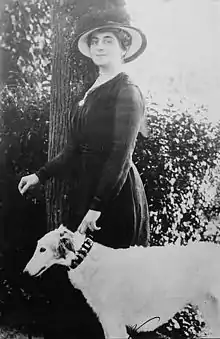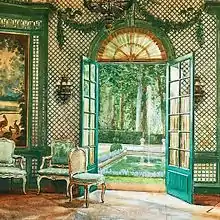Anne Morgan (philanthropist)
Anne Tracy Morgan (July 25, 1873 – January 29, 1952) was an American philanthropist who provided relief efforts in aid to France during and after World War I and II.[1] Morgan was educated privately, traveled frequently and grew up amongst the wealth her father, banker J. P. Morgan, had amassed. She was awarded a medal from the National Institute of Social Science in 1915, the same year she published the story The American Girl. In 1932 she became the first American woman appointed a commander of the French Legion of Honor.
Anne Morgan | |
|---|---|
 | |
| Born | Anne Tracy Morgan July 25, 1873 |
| Died | January 29, 1952 (aged 78) |
| Resting place | Cedar Hill Cemetery (Hartford, Connecticut) |
| Occupation | Philanthropist |
| Parent(s) | John Pierpont Morgan Frances Louisa Tracy |
| Relatives | Morgan family |
| Signature | |
Early years
Anne Tracy Morgan was born on July 25, 1873,[2] at "Cragston" her family's country estate on the Hudson River at Highland Falls, New York,[3] the youngest of four children born to John Pierpont Morgan and his wife, Frances Louisa (née Tracy) Morgan.

Career
In 1903, she became part owner of the Villa Trianon near Versailles, France, along with decorator and socialite Elsie De Wolfe and theatrical/literary agent Elisabeth Marbury.[4] Morgan was instrumental in assisting De Wolfe, her close friend, in pioneering a career in interior decoration. The three women, known as "The Versailles Triumvirate",[5] hosted a salon in France and, in 1903, along with Florence Jaffray Harriman, helped organize the Colony Club, the first women's social club in New York City and, later, helped found the exclusive neighborhood of Sutton Place along Manhattan's East River.
Around 1910, she became a union activist.[6] Anne Morgan actively supported striking female workers in New York's garment industry. She and other wealthy female members of her social circle stood in picket lines with striking shirtwaist workers and contributed financially to their cause.[7] These strikes in New York's garment industry immediately preceded the Triangle Shirtwaist Fire.
By 1921, Morgan's interest in women's employment and experience founding the Colony Club evolved into the American Woman's Association, where a working woman "with ambition, pluck and energy, which will push her up and up in her profession" could network and develop leadership skills. Morgan was quoted saying that although no women of the time were equipped to head a large corporation, "in time there will be plenty of such women -- it requires only evolution."[8] By 1930 the American Woman's Association had constructed a large building of its own in New York City, most recently the Hudson Hotel. Along with a roof garden, numerous parlors, meeting rooms, and residential space, this building featured "a sunny gynmnasium equipped with every facility for body-building, including one of the finest swimming pools in America."[9]

In 1912, she started the Society for the Prevention of Useless Giving (SPUG) with Eleanor Robson Belmont.[10]
In 1916, Morgan and De Wolfe largely funded Cole Porter's first Broadway musical, See America First, produced by Marbury.[11]

From 1917 to 1921, Morgan took residence near the French front, not far from both Soissons and the "Chemin des Dames" at Blérancourt, and ran a formidable help organisation, The American Friends of France (it employed several hundred people at a time, volunteers from abroad and locally recruited staff), financed partly out of her own deep pockets, partly with the help of an active network in the States.[12] The AFF (aka American Committee for Devastated France) was active in succoring noncombatants, organizing a health service that still exists in Soissons, a workshop to provide basic furniture to bombed-out families, a holiday camp for children, and a mobile library that was taken over by the library in Soissons, and so on. She returned in 1939 to help the Soissons evacuees.

Anne Murray Dike, a doctor, joined Anne Morgan in France. The estate of Blérancourt was transformed into a museum and inaugurated in 1930, one year after the death of Anne Murray Dike. The two were rewarded for their services, and they later developed a romantic relationship.[13] Dike is buried in the village cemetery at Blérancourt.[14]
Morgan's friendships included many socialites and celebrities of her day. Her connection to individuals such as Cole Porter, as mentioned above, allowed her to compile a cookbook for charity. Titled the Spécialités de la Maison and published in 1940 to benefit the AFF, it offered recipes by cultural icons such as Pearl S. Buck, Salvador Dalí, and Katharine Hepburn.[15]
She died on January 29, 1952, in Mount Kisco, New York[1] and was interred in Cedar Hill Cemetery in Hartford, Connecticut.[16]
Legacy
In order to maintain the health service network that Anne Morgan and the rest of the American volunteers had created during the First World War in the French region of Aisne, the American Committee founded the «Association d’Hygiène Sociale de l´Aisne» (A.H.S.A), an organization that would inherit the assets, personnel and know-how of the American Committee for Devastated France under the direction of Anne Murray Dike.[17] The Association, that changed its name to «Association Médico-Sociale Anne Morgan» in 1953, after Anne Morgan´s death,[18][19] has persisted to this day and continues with the work that Anne Morgan began more than 100 years ago.
A four-story townhouse built in the Sutton Place neighborhood of Manhattan's Upper East Side in New York City for Morgan in 1921 was donated as a gift to the United Nations in 1972. It is now the official residence of the United Nations Secretary-General.[20]
References
- "Anne Morgan Dies In Mt. Kisko. Daughter of Late J. P. Morgan Was Known for Her Work in Reform and Philanthropy". The New York Times. January 30, 1952. Retrieved May 30, 2011.
Long A Friend of France. Helped Needy There for More Than 30 Years. Leader in American Women's Group. Miss Anne Morgan, daughter of the late J. Pierpont ...
- Carosso, Vincent P.; Carosso, Rose C. (1987). The Morgans: Private International Bankers, 1854-1913. Harvard University Press. p. 682. ISBN 978-0-674-58729-8.
- Lewis, Alfred Allan (2001). Ladies and Not So Gentle Women: Elisabeth Marbury, Anne Morgan, Elsie de Wolfe, Anne Vanderbilt, and Their Times. Penguin Books. p. 50. ISBN 978-0-14-024173-0.
- Ronald, Susan (September 3, 2019). Condé Nast: The Man and His Empire -- A Biography. St. Martin's Publishing Group. ISBN 978-1-250-18004-9.
- Griffin, Gabriele (September 2, 2003). Who's Who in Lesbian and Gay Writing. Routledge. ISBN 978-1-134-72209-9.
- "WGBH American Experience . Triangle Fire . Anne Morgan | PBS". PBS. Archived from the original on March 4, 2011.
- "WGBH American Experience . Triangle Fire | PBS". PBS. Archived from the original on January 19, 2011.
- Gray, Christopher (January 4, 1998). "Streetscapes/The Henry Hudson Hotel, 353 West 57th Street; From Women's Clubhouse to WNET to $75 a Night". New York Times. p. 5 Sec 11. Retrieved December 21, 2019.
- Dixon, Jane (November 23, 1930). "As One Woman to Another: Anne Morgan". The Minneapolis Star Tribune. p. 47. Retrieved December 21, 2019.
- "Society for the Prevention of Useless Giving Issues Its Second Call to Arms. Mrs. Belmont and Miss Anne Morgan Plan a Big Rally in Metropolitan Life Building". The New York Times. November 3, 1913. Retrieved December 16, 2012.
This society, formed as a vigorous protest against the growing custom of exchanging gifts at Christmas without sentiment, the custom of making Christmas gifts for the sake of expediency, or under any other form of compulsion, was organized last year, and carried on an effective and spectacular campaign in the closing weeks of the Christmas shopping season.
- Schwartz, Charles, Cole Porter: A Biography. Cambridge, Massachusetts: Da Capo Press 1979. ISBN 0-306-80097-7, pp. 41-43
- "Anne Morgan Feature". Life Magazine. February 11, 1952. pp. 28–29. Retrieved March 1, 2010.
- "Anne Morgan and the Shirtwaist Strike of 1909-1910" (PDF). www.nyu.edu. Retrieved October 27, 2017.
- The Anne Morgan Story, American Friends of Blérancourt
- American Friends of France; et al. (1940). Spécialités de la Maison. New York: American Friends of France.
- "Anne Tracy Morgan". www.findagrave.com. Retrieved February 22, 2020.
- "amsam.net – Association Médico Sociale Anne Morgan records – C.A.R.D's history". www.amsam.net (in French). Retrieved March 29, 2023.
- "amsam.net – Association Médico Sociale Anne Morgan records – A.M.S.A.M statutes 1953". www.amsam.net (in French). Retrieved March 29, 2023.
- "amsam.net – Association Médico Sociale Anne Morgan records – Decree published in the Journal Officiel in regard to the renaming of the association". www.amsam.net (in French). Retrieved March 29, 2023.
- Kathleen Teltsch (July 15, 1972). "Town House Offered to U. N." The New York Times. Retrieved December 22, 2012.
A five-story Sutton Place town house built more than 50 years ago for the daughter of J. Pierpont Morgan, the financier, has been offered by the owner to the United Nations as a residence for the Secretary General.
Sources
- Morgan, Anne Tracy, Noted Relations: Celebrities, et Cetera. Retrieved 2006
- Morgan, Anne Tracy, Encyclopædia Britannica. Dec 22, 2006
External links
 Media related to Anne Morgan (philanthropist) at Wikimedia Commons
Media related to Anne Morgan (philanthropist) at Wikimedia Commons- Anne Morgan at Find a Grave